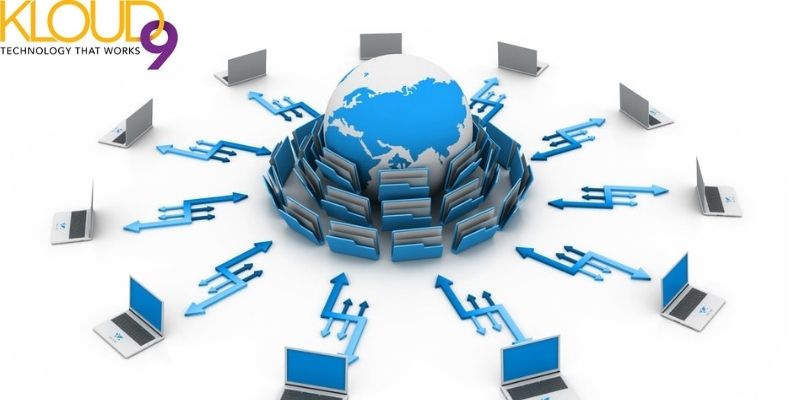Both virtualization and cloud computing revolves around a similar process of developing a useful environment from abridged resources. It is easy to confuse cloud and virtualization because they both help in creating useful environments from intellectual resources.
While virtualization allows the creation of many replicating technological environments, or dedicated objectives, from a specialized physical hardware operative system, cloud computing aligns as IT environments that distribute scalable resources, pool, and abstract beyond networking environments.
The essence of cloud creation is to allow seamless computing of information, which is a performance of running an assigned work inside the system. Cloud creation includes virtualization, bare metals, and container software that. However, virtualization and cloud computing are different, having several benefits.
Cloud Computing
The conception about cloud computing is in line with a non-disconnected use of features, and applications, that serve as computer data servers to keep safe information even when there is an attack within the system's software.
Cloud computing can allow both server processing and data storage from anywhere if the information is effective on the virtual server. Also, an individual user can access the information from another environment if there is an availability of an access network.
Due to the large structure-based feature of cloud computing, organizations and companies consider it an assuring trend to migrate information to the cloud for safekeeping as it also enables companies to have an improved economy.
In cloud computing, the service provider is often accountable for the task and tools. Some of the cloud computing tasks are; storage, upgrade, development, maintenance, backup, and storage that allows the user stress-free access to information. Also, the business organization may not need to migrate a team to an unrecognized sector.
Benefits of Cloud Computing
- With cloud computing power, complex tasks can be easily achieved.
- Cloud computing can store, secure and recover data even in the face of disaster where there could be a risk of data loss.
- Cloud computing allows both remote and mobile workers to be done seamlessly.
- With cloud computing, data can be shared in real-time.
- Individual users can gain proper access to pricey software.
- Cloud computing can reduce costs and save time.
- There is a better availability that allows information to be saved in the cloud.
- Cloud computing enables complementing support for IT functions.
Virtualization
Unlike cloud computing, virtualization is a different kind of technology that can be reviewed as software models that are developed as virtual installation services to aid physical configurations.
It is also a service technology that allows tech individuals to run multiple operating systems, using more than one application at the same time, and on the same mechanical device.
A part of the operating system can also be used in carrying out appropriate technological advantages within a specific system. This is to say that; virtualization does not necessarily need an entire operating system to run. Virtualization has improved IT efficacy and lessened its cost.
With virtualization technology, more productive servers can be created, which helps in easy administration of data, lessens the cost of purchasing host structures, physical servers, and maintenance reduction. The organization can serve more money with all these reductions.
Benefits of Virtualization
One of the most important and recognized benefits of virtualization is its ability to run more than one operating system within the same environment. However, there are many other benefits as follows:
It Reduces Energy Consumption
Normally, the cost of cooling and powering the server can be on the high side as a server is created to remain in a designated place for a long period. After summing up the total cost of electricity outlay of a server during the entire period of its life, a significant amount can be realized.
However, the essence of virtualization is to reduce the number of physical servers by separating the cost into air-conditioning and electricity, thereby the consumption of energy by the server alone is dramatically reduced.
Licensing
Virtualization provides a lot of gain in licensing. With Microsoft offering a license for windows servers, virtual environments are easily accessed. Individual users can install about 4 virtual servers in the case of corporate license. But when purchasing a data center license, individuals can choose to install as many virtual window servers as they are unlimited.
Portability
Virtualization is easy to handle, as it is merely a sequence of files. Most servers are not portable but virtualization is a physical machine that has proven otherwise.
Hardware Integration
Virtualization technology enables the stimulation of virtual hardware. This also allows a significant reduction of cost when purchasing multiple software equipment. Due to cost reduction, power is also less consumed.
Simplified Monitoring
There may be many ways to monitor a server, but using virtualization requires the monitoring of a specific physical server.
Other Key Differences between Cloud Computing and Virtualization
-
- The most significant difference between the two technological concepts is that virtualization deals with hardware and software manipulation, while cloud computing happens as a result of these actions.
- In a practical application, cloud computing is a concept that is Invented from virtualization.
- The lack of order between the two concepts is that cloud computing makes use of virtualized products within its structures.
- Cloud computing allows small business IT support organizations to share and offer data availability to outsiders within the reach of a networking environment. By allowing this, it automatically uses software that has a series of virtual physical, ending up as virtualization.
- With cloud computing concepts, the architectural cost of a system is reduced making way for customers' easy accessibility. While virtualization offers facilities based on physical infrastructures, accommodating large structures that would have been lost.
- Cloud computing can be termed as an IT architecture concept while Virtualization can be termed as a product since the purchase of software solutions can be made possible in this concept.
Conclusion
Both virtualization and cloud computing are technological concepts that relate to software solutions and physical environments. Since both concepts are extensively connected, resolving each of these concepts is a necessity to get rid of unnecessary confusion and understand the purpose of each server. If you are looking for top-notch Virtualization and Cloud Computing Solutions consult the experts at Kloud9 IT for customized solutions.





You must be logged in to post a comment.